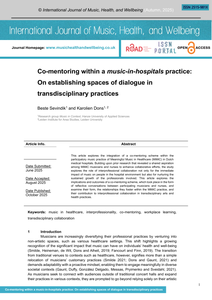This paper will explore types of learning, which takes place when musicians work in situations where they have to connect to community contexts.It will first address musicians’ changing professional roles in the changing sociocultural landscape and the need for lifelong learning and emergence of life wide learning which this brings about. It will then go into the rise of the ‘community musician’ and the leadership this requires to exercise, illuminated through an exampleof musicians working with people living with dementia and their care staff.Based on this example perspectives of these musicians’ learning are discussed, where especially transformative learning, where the musician needs to change her frame of reference (Mezirow) and transitional learning, brought about by small changes in musicians’ life world and biography, seem at stake.Keynote address: Royal College of Music in Stockholm: symposium titled: Students' ownership of learning: a meeting place for teachers and students in higher music education,15-17 September 2010
DOCUMENT

This article explores the integration of a co-mentoring scheme within the participatory music practice of Meaningful Music in Healthcare (MiMiC) in Dutch medical hospitals. Building upon prior research that revealed a shared aspiration among MiMiC musicians and nurses to enhance collaborative efforts, the study explores the role of interprofessional collaboration not only for the immediate impact of music on people in the hospital environment but also for nurturing the sustained growth of the professionals involved. This article explores the implications and outcomes of a co-mentoring scheme, which took place in the form of reflective conversations between participating musicians and nurses, and examine their form, the relationships they foster within the MiMiC practice, and their contribution to interprofessional collaboration in transdisciplinary arts and health practices.
DOCUMENT

As the Dutch population is aging, the field of music-in-healthcare keeps expanding. Healthcare, institutionally and at home, is multiprofessional and demands interprofessional collaboration. Musicians are sought-after collaborators in social and healthcare fields, yet lesser-known agents of this multiprofessional group. Although live music supports social-emotional wellbeing and vitality, and nurtures compassionate care delivery, interprofessional collaboration between musicians, social work, and healthcare professionals remains marginal. This limits optimising and integrating music-making in the care. A significant part of this problem is a lack of collaborative transdisciplinary education for music, social, and healthcare students that deep-dives into the development of interprofessional skills. To meet the growing demand for musical collaborations by particularly elderly care organisations, and to innovate musical contributions to the quality of social and healthcare in Northern Netherlands, a transdisciplinary education for music, physiotherapy, and social work studies is needed. This project aims to equip multiprofessional student groups of Hanze with interprofessional skills through co-creative transdisciplinary learning aimed at innovating and improving musical collaborative approaches for working with vulnerable, often older people. The education builds upon experiential learning in Learning LABs, and collaborative project work in real-life care settings, supported by transdisciplinary community forming.The expected outcomes include a new concept of a transdisciplinary education for HBO-curricula, concrete building blocks for a transdisciplinary arts-in-health minor study, innovative student-led approaches for supporting the care and wellbeing of (older) vulnerable people, enhanced integration of musicians in interprofessional care teams, and new interprofessional structures for educational collaboration between music, social work and healthcare faculties.
Since 2015, the research group Lifelong Learning in Music of Hanze University of Applied Sciences Groningen, together with the University Medical Center Groningen (UMCG), has developed and researched the MiMiC practice for patients and nurses on surgical wards. The musicians make tailor-made music in the patients' rooms in collaboration with patients and nurses. They do this on the basis of verbal and non-verbal contact with patients and nurses. Person-centred music-making turns out to be easy to realise in a medical setting and to be meaningful for all involved. People who have just had surgery experience less pain. Nurses feel more deeply involved with their patients. Musicians show sensitivity for the social context in which they carry out their artistic practice.In this project the research group is developing an innovative artistic practice with a focus on elderly patients. Musicians work with patients and the care staff that are taking care of these patients during their stay in hospital. The research should lead to insights in the effects of this practice and to a new training for master students and professional musicians who want wish to specialise themselves in this field. Pilots on six different wards of the UMCG with professional musicians and master students are part of the research which will last two years in its entirety. The project has been granted funding from the 'Banning de Jong Fonds' of the national 'Prins Bernhard Cultuurfonds' and the 'Fonds Sluyterman van Loo'.
The development of a training for musicians aspiring to work in contexts with people with dementia in the Netherlands. This project was inspired by the renowned Music for Life programme by Wigmore Hall Learning in London, UK and its in-depth ethnographic study by the research group Lifelong Learning in Music which was published as While the Music Lasts by Smilde, Page and Alheit (2012).